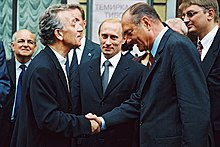Yuri Temirkanov


Yuri Khatuevich Temirkanov (Russian: Ю́рий Хату́евич Темирка́нов; Template:Lang-kbd; born 10 December 1938) is a Russian conductor[1] of Circassian (Kabardian) origin.
Early life
Born in 1938 in the North Caucasus city of Nalchik, Temirkanov attended the Leningrad School for Talented Children where he continued his studies in violin and viola.
Career
In 1968, he was appointed Principal Conductor of the then-renamed Leningrad Symphony where he remained until his appointment as Music Director of the Kirov Opera and Ballet in 1976.
Temirkanov was the first Soviet artist permitted to perform in the United States after cultural relations were resumed with the Soviet Union at the end of the Soviet–Afghan War in 1988.
Temirkanov became artistic director and chief conductor of the St. Petersburg Philharmonic in 1988. He was music director of the Baltimore Symphony Orchestra from 2000 until 2006. He has served as principal guest conductor of the Danish National Symphony Orchestra and conductor laureate of the Royal Philharmonic Orchestra in London. In 2015, the Teatro La Fenice awarded Temirkanov its prize 'A Life for Music' (unofficially known as the Nobel Prize for Musicians).[2]
Honors and awards
- State Prize of the Russian Federation in Literature and Art in 1998 (4 June 1999) – for concert programs 1995–1998 Academic Symphony Orchestra, St. Petersburg Philharmonic Society named after Shostakovich
- Russian Federation President Prize in Literature and Art in 2002 (13 February 2003)
- The 6432 Temirkanov asteroid was named after the conductor (1975)
 Order of the Rising Sun, 3rd Class, Gold Rays with Neck Ribbon (2015)
Order of the Rising Sun, 3rd Class, Gold Rays with Neck Ribbon (2015)
Controversy
Temirkanov has drawn attention for saying that women are essentially weak and thus not well suited to be classical conductors.[3] In 2016, he said:
- "Yes, women can be conductors. I am not against them conducting. But I simply don't like it."[4]
References
- ^ "Yuri Temirkanov Named Music Director Of Teatro Regio di Parma". Opera Chic. 13 June 2008. Retrieved 16 January 2019.
- ^ "Russian conductor wins 'Nobel Prize' for musicians". Russia Beyond the Headlines. 7 April 2015. Retrieved 16 January 2019.
- ^ "Women, Gays and Classical Music". The New Yorker. 3 October 2013. Retrieved 16 January 2019.
- ^ "Settling the Score: Women Conductors Talk About the Slow Road to Equality". Billboard. 2019-12-09. Retrieved 2020-08-31.
External links
- Interview with Yuri Temirkanov, July 17, 1997
- 1938 births
- Living people
- Musicians from Nalchik
- Circassian people of Russia
- Russian classical violists
- Full Cavaliers of the Order "For Merit to the Fatherland"
- Recipients of the Order of Lenin
- People's Artists of the USSR
- People's Artists of Russia
- State Prize of the Russian Federation laureates
- Recipients of the USSR State Prize
- Glinka State Prize of the RSFSR winners
- Soviet conductors (music)
- 20th-century Russian conductors (music)
- Russian male conductors (music)
- 20th-century Russian male musicians
- 20th-century classical musicians
- 21st-century Russian conductors (music)
- 21st-century Russian male musicians
- 20th-century violists
- 21st-century violists
